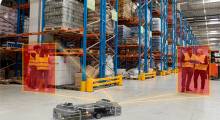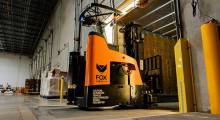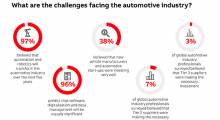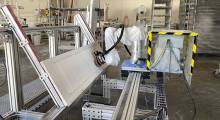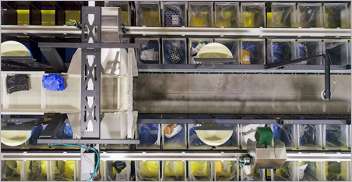The rapid advance of technology has changed up the way business acquires everything from enterprise software to autonomous mobile robots (AMRs), with more products offered “as a service” rather than through capital purchase or traditional lease. Now that some lift trucks are smart, robotic assets, is lift truck leasing going to morph into a robotics-as-a-service (RaaS) arrangement?
The short answer, say lift truck providers, is not overnight. Robotics adds predictability, and associated Cloud for lift truck fleets is already typically subscription-based, but it will take time for RaaS models to mature.
One reason, says John Rosenberger, director of global telematics for The Raymond Corp., is that some earlier variants of automated lift trucks required guidance infrastructure such as reflectors or tags embedded in the floor. Such installations go against the grain of the as-a-service concept, he adds.
“With an ‘as a service’ model, or a subscription model, it implies that you can pay for a service and easily turn it on, or turn it off, at will,” says Rosenberger. “If you’re going to put automation under that model, you have to somehow either fund any infrastructure change needed upfront or finance it over a period of time.”
Some new vision-guided automated lift trucks don’t require infrastructure, adds Rosenberger, so it’s conceivable that a RaaS model for lift trucks could emerge over time. In the meantime, automated or vision-guided lift trucks can be leased. Already, he adds, a subscription model has proven to be an attractive means of offering lift truck telematics and associated software.
Leasing has become more prevalent over the past decade. According to Modern Materials Handling’s annual lift truck survey for 2020, across all truck types, 48% of lift trucks were purchased in 2020 and 52% were leased. A decade ago, capital purchase was more prevalent, say vendors, but end-user buying methods tend to shift slowly.
“Companies are accustomed to using the financial tools they use today for lift truck acquisition—they either lean toward capital purchase or they lease and they tend to stick to those models,” says Jim Gaskell, director of global technology business development for Crown Equipment. “Now that you are bringing automated lift trucks into the picture, companies will likely try to fit these in with how they are used to budgeting and paying for things.”
Gaskell also says it’s possible an RaaS model for robotic lift trucks could emerge in the market, in part because robotic trucks are highly predictable in how much they will move in a shift, which could lend itself to fee structures based on units of production. “With automation, you could do that [production rate] because the system is based on how many pallets are going to be moved, and that is highly predictable,” says Gaskell.
For now, don’t expect leasing of automated lift trucks to suddenly become RaaS. Robotic lift trucks are also relatively expensive, so even when leased or otherwise moved into “OpEX” budgets, they probably can’t slip into existing budgets without some planning. As Gaskell puts it, “it’s a sizeable enough purchase that you have to budget for it either way.”
About the Author
Follow Robotics 24/7 on Linkedin
About the Author
Follow Robotics 24/7 on Linkedin
Article topics
Email Sign Up




